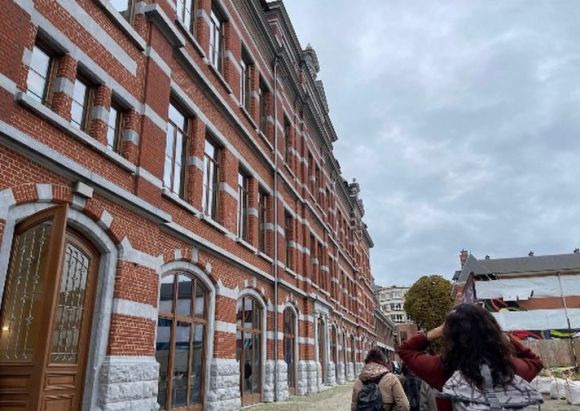
Facade of building ABC in project U-Square. Picture: Lydia Cortabitarte.
The U-Square project, co-financed by the European Fund for Regional Development, will host facilities ranging from social housing to research centers and a food market.
In 1992, after 200 years of service, the Belgium Gendarmerie was demilitarized, set to become a civilian police force. This historical change resulted in the abandonment of the Royal School of the Gendarmerie: four hectares of barracks, stables and other facilities from the late 19th century. Resigned to oblivion for three decades, the Brussels Region, together with the Université libre de Bruxelles (ULB) and Vrije Universiteit Brussel (VUB), is determined to resurrect it as a dynamic, urban, sustainable, and innovative district.
In the words of Benjamin Waynes, the project's chief scientist and member of the design committee, the intention is to create “a city within a city” and not just a university campus. Therefore, in addition to research centers, the approximately 15 buildings on the site will house startup accelerators, public parks, a marketplace, an autism research center, and even student residences and social housing. The latter two aim to alleviate the city's housing market, according to Waynes, by allocating 70% of the new social housing to rentals.
This new district will also position itself as a standard-bearer in promoting environmentally sustainable construction and operation. As to use “far fewer fossil fuels”, heating and air conditioning will be provided by geothermal energy produced 120 meters below the site. Photovoltaic panels will also be installed on the roofs of the unprotected buildings. As for the restoration of the buildings, materials already available were re-used: old windows utilized as shower screens or interior partitions, old bricks placed in non-structural work such as stairs or fillings, shells used to improve thermal insulation, and furniture taken from unused rooms in the ULB, VUB and European Commission buildings.
To finance this ambitious project born in 2017, the local government has been supported by the European Commission, specifically by the European Fund for Regional Development (ERDF), part of the wider Cohesion Fund. U-Square meets the objective of “improving the environmental quality of urban spaces,” as explained by the deputy director of ERDF Unit, Quentin Richard. The program, which has so far secured more than 12 million euros from the EU alone, is expected to continue to receive funding until the site's estimated completion date of 2035.
By Lydia Cortabitarte



